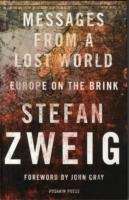Messages from a Lost World, Europe on the Brink

Editorial Pushkin Press
Fecha de edición enero 2016 · Edición nº 1
Idioma inglés
EAN 9781782271550
224 páginas
Libro
encuadernado en tapa dura
Resumen del libro
'Darkness must fall before we are aware of the majesty of the stars above our heads. It was necessary for this dark hour to fall, perhaps the darkest in history, to make us realize that freedom is as vital to our soul as breathing to our body.' As Europe faced its darkest days, Stefan Zweig was a passionate voice for tolerance, peace and a world without borders. In these moving, ardent essays, speeches and articles, composed before and during the Second World War, one of the twentieth century's greatest writers mounts a defence of European unity against terror and brutality.
From the dreamlike 'The Sleepless World', written in 1914, through the poignant 'The Vienna of Yesterday', to the impassioned 'In This Dark Hour', one of his final addresses, given in 1941, Zweig envisages a Europe free of nationalism and pledged to pluralism, culture and brotherhood. These haunting lost messages, all appearing in English for the first time and some newly discovered, distil Zweig's courage, belief and richness of learning to give the essence of a writer; a spiritual will and testament to stand alongside his memoir, The World of Yesterday. Brief and yet intense, they are a tragic reminder of a world lost to the 'bloody vortex of history', but also a powerful statement of one man's belief in the creative imagination and the potential of humanity, with a resounding relevance today.
Translated by Will Stone, with an introduction by philosopher and historian of ideas John Gray.
Biografía del autor
x{0026}lt;P x{0026}lt;B Stefan Zweigx{0026}lt;/B (Viena, 1881 x{0026} x02013; Petrópolis, 1942) fue un destacado escritor, biógrafo y ensayista austríaco, célebre por su estilo psicológico y humanista, que alcanzó una inmensa popularidad en las décadas de 1920 y 1930. Hijo de una familia judía acomodada, estudió filosofía y literatura en Viena, donde publicó sus primeros poemas y se relacionó con la élite cultural de su tiempo. Viajero incansable y firme pacifista, se opuso activamente a la Primera Guerra Mundial, lo que marcó profundamente su obra.x{0026}lt;/P x{0026}lt;P Autor prolífico en diversos géneros, escribió ficciones inolvidables como x{0026}lt;I Carta de una desconocidax{0026}lt;/I , x{0026}lt;I Amokx{0026}lt;/I , x{0026}lt;I La piedad peligrosax{0026}lt;/I y x{0026}lt;I Novela de ajedrezx{0026}lt;/I , así como estudios históricos y biografías literarias sobre figuras como Balzac, Dickens, Dostoyevski, María Antonieta y Fouché. Su obra x{0026}lt;I Momentos estelares de la humanidadx{0026}lt;/I es una de las más representativas de su talento narrativo y visión histórica.x{0026}lt;/P x{0026}lt;P Tras el auge del nazismo y la censura de sus escritos, Zweig se exilió sucesivamente en Inglaterra, Estados Unidos y Brasil. A pesar de su admiración por este último país, el desencanto ante el destino de Europa lo llevó a suicidarse junto a su esposa. Su autobiografía póstuma, x{0026}lt;I El mundo de ayerx{0026}lt;/I , es un emotivo testimonio de la cultura europea perdida. Su legado literario ha inspirado numerosas adaptaciones cinematográficas, incluida x{0026}lt;I El Gran Hotel Budapestx{0026}lt;/I de Wes Anderson, y sigue siendo valorado por su profundidad humanista y su mirada crítica ante los totalitarismos.x{0026}lt;/P








